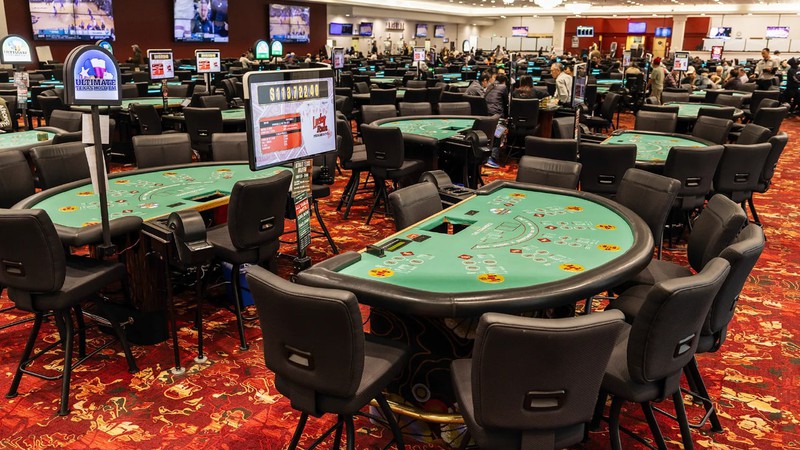
Photo by Ted Soqui for CalMatters
BY RYAN SABALOW AND JEREMIA KIMELMAN, CalMatters
Powerful tribal casinos and their rivals in California’s multi-billion dollar gambling industry are fighting an epic battle in the Legislature this year. Millions of dollars in tax revenues for local cities hang in the balance.
Pending legislation would let California’s tribes sue their competitors, private card clubs, over their claim that card rooms are violating the tribes’ exclusive rights to Las Vegas-style gambling.
Card rooms have responded with an enormous lobbying blitz. The Hawaiian Gardens Casino in Los Angeles County spent a staggering $9.1 million on lobbying last year, the second highest amount reported to state regulators. Only the international oil giant, Chevron Corp., spent more.
“If you’re going to attack us and try to take away what we’ve had for decades, then we’ve got to fight back,” said Keith Sharp, the card room’s general counsel. “And so we’re going to spend the money that we need to spend. I mean it’s about survival at this point.”
Cities also have a lot at stake with the card rooms. San Jose officials told legislators they could hire 80 police officers if they could add 30 more tables to their local card rooms. Nearly two thirds of the budget for the city of Hawaiian Gardens and almost half for the city of Commerce, also in Los Angeles County, come from local card rooms.
“Those games, we’re very dependent on here in the city,” said Commerce Mayor Hugo Argumedo. “They provide many of the programs and services that we offer to the residents in our community.”
The legislation, Senate Bill 549, is backed primarily by a group of Native American tribes that run major casinos. The tribes are among the most influential and biggest spending lobbies in Sacramento. Since 2014, California’s candidates for state office have received about $23.5 million from tribes. That’s more than double what oil companies have given the state’s politicians during the same years.
The state’s card room industry, by comparison, has donated about $3.8 million during the same timeframe.
A group of tribes contend the 80 or so privately-owned gambling halls are illegally offering games such as blackjack, baccarat and pai gow poker, and by doing so, they’ve for years been stealing hundreds of millions of dollars of revenue from historically disenfranchised tribal communities across California.
“It’s not about killing card rooms. It’s not about killing cities. It’s about protecting what’s ours,” Tuari Bigknife, the attorney general for the Viejas Band of Kumeyaay Indians, told CalMatters. His tribe operates a large casino in San Diego County.
SB 549 is pending before the Assembly Governmental Organization Committee, which handles gambling legislation. A hearing hasn’t been scheduled, but those following the bill say it will be heard later in April or in May.
Card rooms frame the issue as a David vs. Goliath fight, since their annual earnings are barely 10% of what tribal governments make from gambling at their 70 tribal casinos. The card rooms also have influential allies in local governments officials who say their cities could go bankrupt if their local gambling hall loses this legislative fight.
When the pandemic shut down gaming in Hawaiian Gardens, the city was forced to lay off much of its staff and cut services. Mayor Victor Farfan said it was a sign of what would happen if the card room was no longer able to play the disputed games.
“We’re very, very limited in what we can do,” Farfan said in an interview with CalMatters at Hawaiian Gardens City Hall, the card room visible from the parking lot. “And so we’re fortunate enough to have a revenue source that we do today.”
Tribes, however, argue there are other ways for cities to raise money without infringing on tribes’ gambling rights that California voters enshrined into the state’s constitution.
“They can tax; they can issue bonds; they can do lots of things,” said Bigknife, the attorney general for the Viejas tribe. “All this does is shut down illegal revenue.”
Read more: High stakes: Inside the multimillion-dollar battle for gambling rights in California on CalMatters